BUS706 International Business Law & Ethics: Detailed Case Analysis
VerifiedAdded on 2023/03/30
|13
|2785
|134
Report
AI Summary
This paper provides a comprehensive analysis of legal and ethical issues arising from three distinct case studies. The first case examines the ethical implications of the ban imposed on Huawei by the US government, focusing on the utilitarian perspective that prioritizes the security of US citizens over the interests of Huawei's global customer base, while also considering Huawei's potential arguments based on deontological ethics. The second case study delves into the enforceability of an electronic contract between Kettle Black and PuriTea under the UN Convention on the Use of Electronic Communications in International Contracts (ECC) and the UN Convention on Contracts for the International Sale of Goods (CISG), further scrutinizing the validity of electronic signatures according to the UNCITRAL Model Law on Electronic Signatures (MLES). The final case study assesses the enforceability of an arbitral award issued in a dispute between Styled and Wicks, considering the implications of the New York Convention, the role of the ICC International Court of Arbitration, and the legal status of Styled as an unincorporated entity.

International Business Law and Ethics
Paraphrase This Document
Need a fresh take? Get an instant paraphrase of this document with our AI Paraphraser
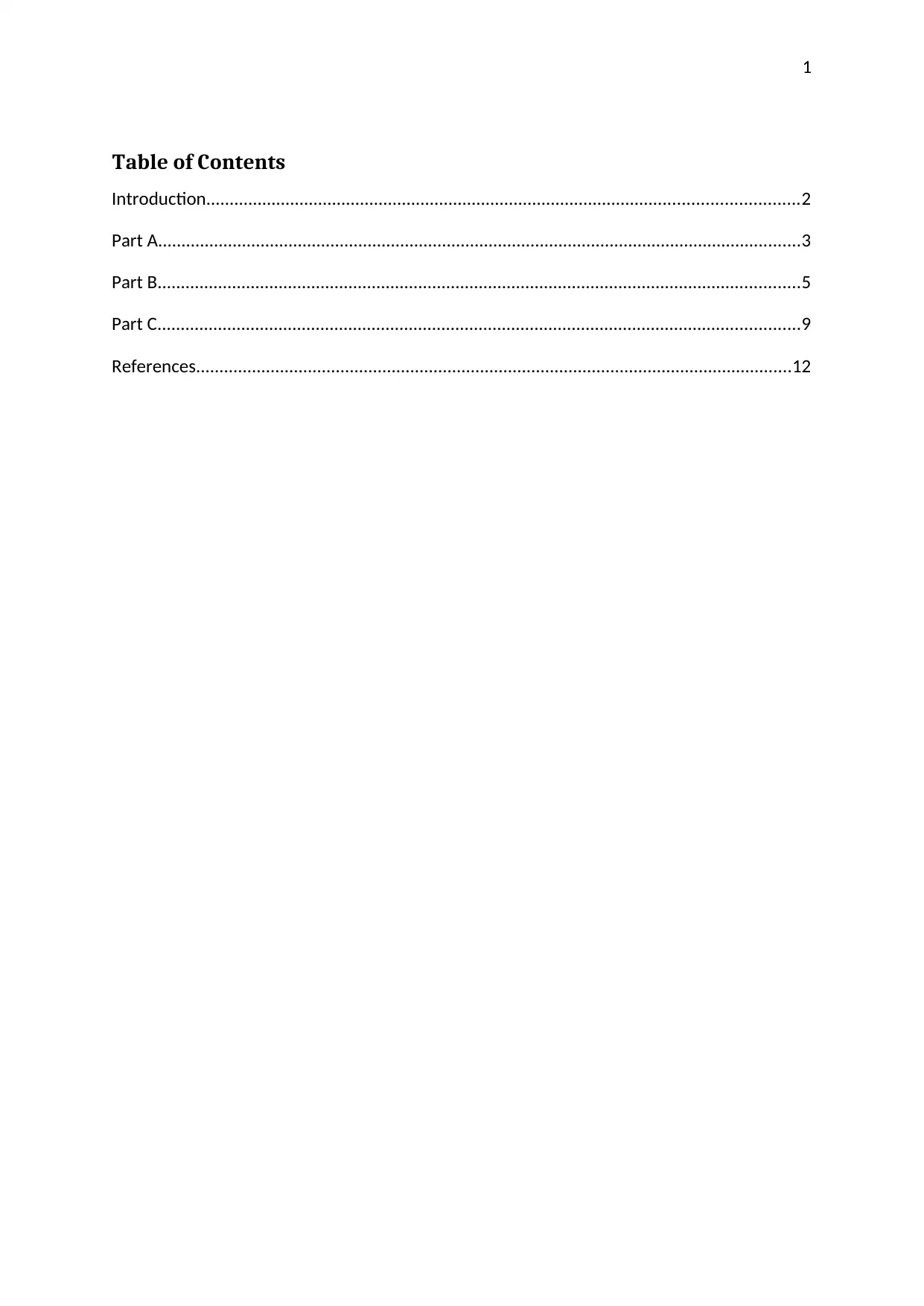
1
Table of Contents
Introduction...............................................................................................................................2
Part A..........................................................................................................................................3
Part B..........................................................................................................................................5
Part C..........................................................................................................................................9
References................................................................................................................................12
Table of Contents
Introduction...............................................................................................................................2
Part A..........................................................................................................................................3
Part B..........................................................................................................................................5
Part C..........................................................................................................................................9
References................................................................................................................................12
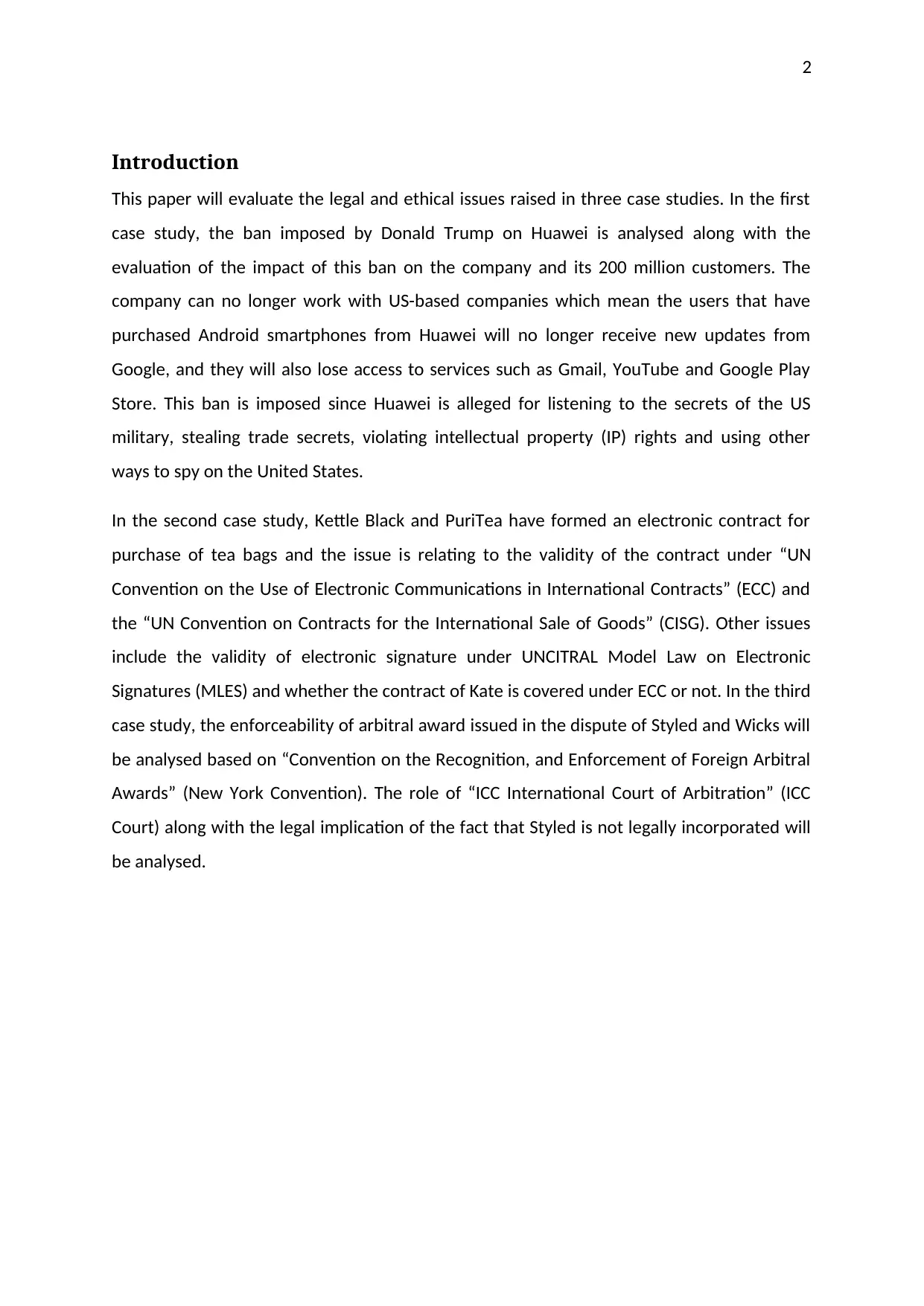
2
Introduction
This paper will evaluate the legal and ethical issues raised in three case studies. In the first
case study, the ban imposed by Donald Trump on Huawei is analysed along with the
evaluation of the impact of this ban on the company and its 200 million customers. The
company can no longer work with US-based companies which mean the users that have
purchased Android smartphones from Huawei will no longer receive new updates from
Google, and they will also lose access to services such as Gmail, YouTube and Google Play
Store. This ban is imposed since Huawei is alleged for listening to the secrets of the US
military, stealing trade secrets, violating intellectual property (IP) rights and using other
ways to spy on the United States.
In the second case study, Kettle Black and PuriTea have formed an electronic contract for
purchase of tea bags and the issue is relating to the validity of the contract under “UN
Convention on the Use of Electronic Communications in International Contracts” (ECC) and
the “UN Convention on Contracts for the International Sale of Goods” (CISG). Other issues
include the validity of electronic signature under UNCITRAL Model Law on Electronic
Signatures (MLES) and whether the contract of Kate is covered under ECC or not. In the third
case study, the enforceability of arbitral award issued in the dispute of Styled and Wicks will
be analysed based on “Convention on the Recognition, and Enforcement of Foreign Arbitral
Awards” (New York Convention). The role of “ICC International Court of Arbitration” (ICC
Court) along with the legal implication of the fact that Styled is not legally incorporated will
be analysed.
Introduction
This paper will evaluate the legal and ethical issues raised in three case studies. In the first
case study, the ban imposed by Donald Trump on Huawei is analysed along with the
evaluation of the impact of this ban on the company and its 200 million customers. The
company can no longer work with US-based companies which mean the users that have
purchased Android smartphones from Huawei will no longer receive new updates from
Google, and they will also lose access to services such as Gmail, YouTube and Google Play
Store. This ban is imposed since Huawei is alleged for listening to the secrets of the US
military, stealing trade secrets, violating intellectual property (IP) rights and using other
ways to spy on the United States.
In the second case study, Kettle Black and PuriTea have formed an electronic contract for
purchase of tea bags and the issue is relating to the validity of the contract under “UN
Convention on the Use of Electronic Communications in International Contracts” (ECC) and
the “UN Convention on Contracts for the International Sale of Goods” (CISG). Other issues
include the validity of electronic signature under UNCITRAL Model Law on Electronic
Signatures (MLES) and whether the contract of Kate is covered under ECC or not. In the third
case study, the enforceability of arbitral award issued in the dispute of Styled and Wicks will
be analysed based on “Convention on the Recognition, and Enforcement of Foreign Arbitral
Awards” (New York Convention). The role of “ICC International Court of Arbitration” (ICC
Court) along with the legal implication of the fact that Styled is not legally incorporated will
be analysed.
⊘ This is a preview!⊘
Do you want full access?
Subscribe today to unlock all pages.

Trusted by 1+ million students worldwide
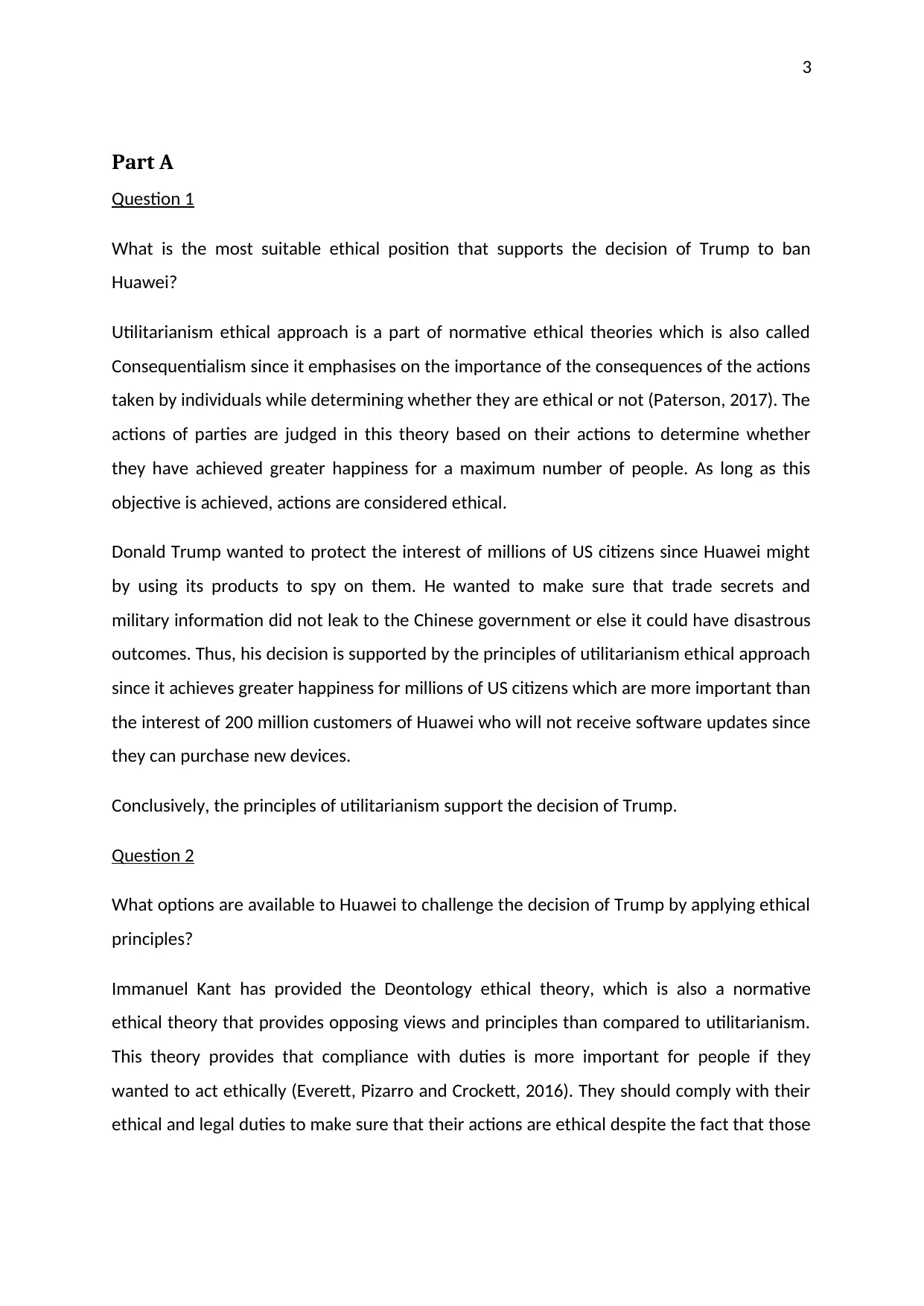
3
Part A
Question 1
What is the most suitable ethical position that supports the decision of Trump to ban
Huawei?
Utilitarianism ethical approach is a part of normative ethical theories which is also called
Consequentialism since it emphasises on the importance of the consequences of the actions
taken by individuals while determining whether they are ethical or not (Paterson, 2017). The
actions of parties are judged in this theory based on their actions to determine whether
they have achieved greater happiness for a maximum number of people. As long as this
objective is achieved, actions are considered ethical.
Donald Trump wanted to protect the interest of millions of US citizens since Huawei might
by using its products to spy on them. He wanted to make sure that trade secrets and
military information did not leak to the Chinese government or else it could have disastrous
outcomes. Thus, his decision is supported by the principles of utilitarianism ethical approach
since it achieves greater happiness for millions of US citizens which are more important than
the interest of 200 million customers of Huawei who will not receive software updates since
they can purchase new devices.
Conclusively, the principles of utilitarianism support the decision of Trump.
Question 2
What options are available to Huawei to challenge the decision of Trump by applying ethical
principles?
Immanuel Kant has provided the Deontology ethical theory, which is also a normative
ethical theory that provides opposing views and principles than compared to utilitarianism.
This theory provides that compliance with duties is more important for people if they
wanted to act ethically (Everett, Pizarro and Crockett, 2016). They should comply with their
ethical and legal duties to make sure that their actions are ethical despite the fact that those
Part A
Question 1
What is the most suitable ethical position that supports the decision of Trump to ban
Huawei?
Utilitarianism ethical approach is a part of normative ethical theories which is also called
Consequentialism since it emphasises on the importance of the consequences of the actions
taken by individuals while determining whether they are ethical or not (Paterson, 2017). The
actions of parties are judged in this theory based on their actions to determine whether
they have achieved greater happiness for a maximum number of people. As long as this
objective is achieved, actions are considered ethical.
Donald Trump wanted to protect the interest of millions of US citizens since Huawei might
by using its products to spy on them. He wanted to make sure that trade secrets and
military information did not leak to the Chinese government or else it could have disastrous
outcomes. Thus, his decision is supported by the principles of utilitarianism ethical approach
since it achieves greater happiness for millions of US citizens which are more important than
the interest of 200 million customers of Huawei who will not receive software updates since
they can purchase new devices.
Conclusively, the principles of utilitarianism support the decision of Trump.
Question 2
What options are available to Huawei to challenge the decision of Trump by applying ethical
principles?
Immanuel Kant has provided the Deontology ethical theory, which is also a normative
ethical theory that provides opposing views and principles than compared to utilitarianism.
This theory provides that compliance with duties is more important for people if they
wanted to act ethically (Everett, Pizarro and Crockett, 2016). They should comply with their
ethical and legal duties to make sure that their actions are ethical despite the fact that those
Paraphrase This Document
Need a fresh take? Get an instant paraphrase of this document with our AI Paraphraser
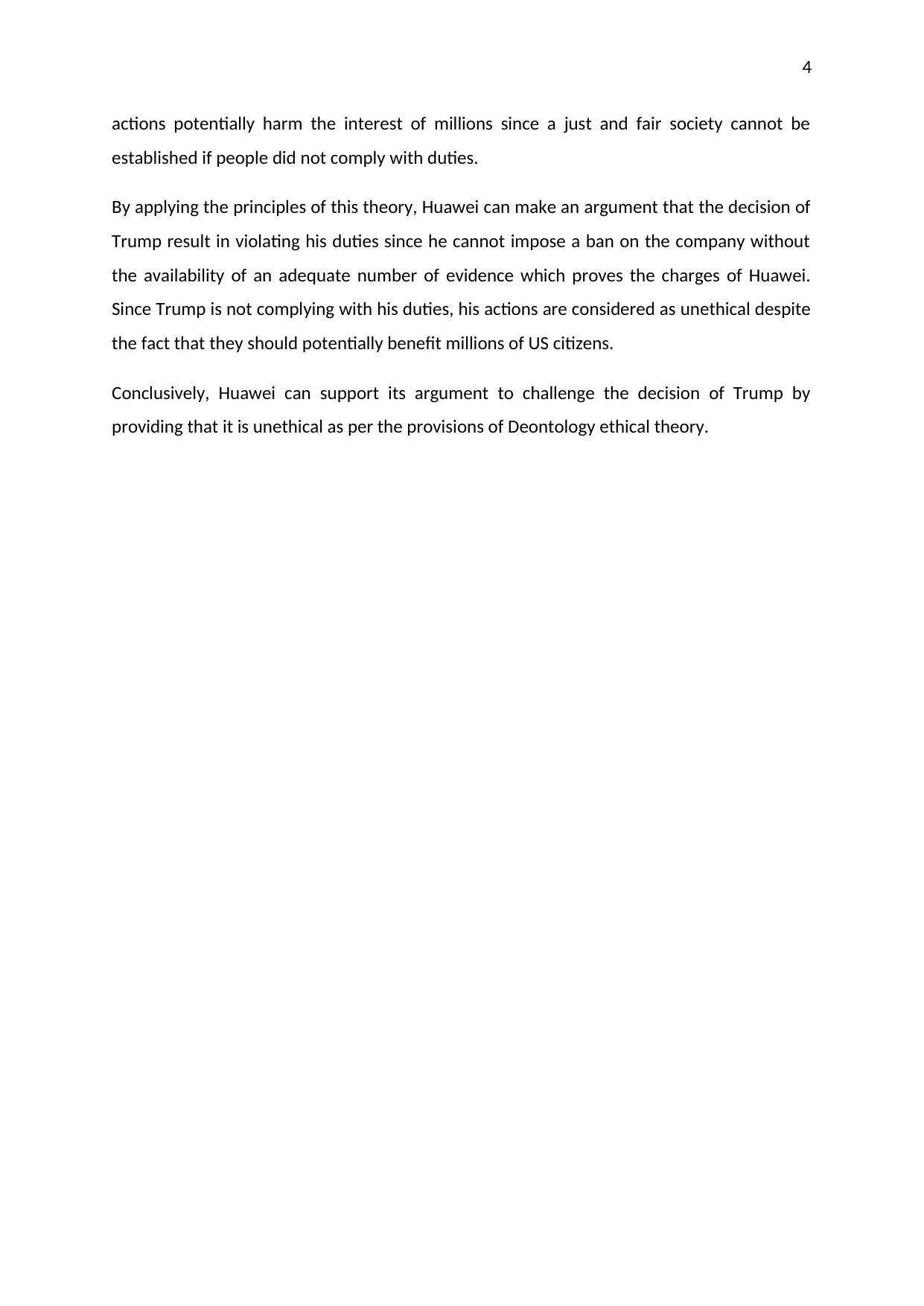
4
actions potentially harm the interest of millions since a just and fair society cannot be
established if people did not comply with duties.
By applying the principles of this theory, Huawei can make an argument that the decision of
Trump result in violating his duties since he cannot impose a ban on the company without
the availability of an adequate number of evidence which proves the charges of Huawei.
Since Trump is not complying with his duties, his actions are considered as unethical despite
the fact that they should potentially benefit millions of US citizens.
Conclusively, Huawei can support its argument to challenge the decision of Trump by
providing that it is unethical as per the provisions of Deontology ethical theory.
actions potentially harm the interest of millions since a just and fair society cannot be
established if people did not comply with duties.
By applying the principles of this theory, Huawei can make an argument that the decision of
Trump result in violating his duties since he cannot impose a ban on the company without
the availability of an adequate number of evidence which proves the charges of Huawei.
Since Trump is not complying with his duties, his actions are considered as unethical despite
the fact that they should potentially benefit millions of US citizens.
Conclusively, Huawei can support its argument to challenge the decision of Trump by
providing that it is unethical as per the provisions of Deontology ethical theory.
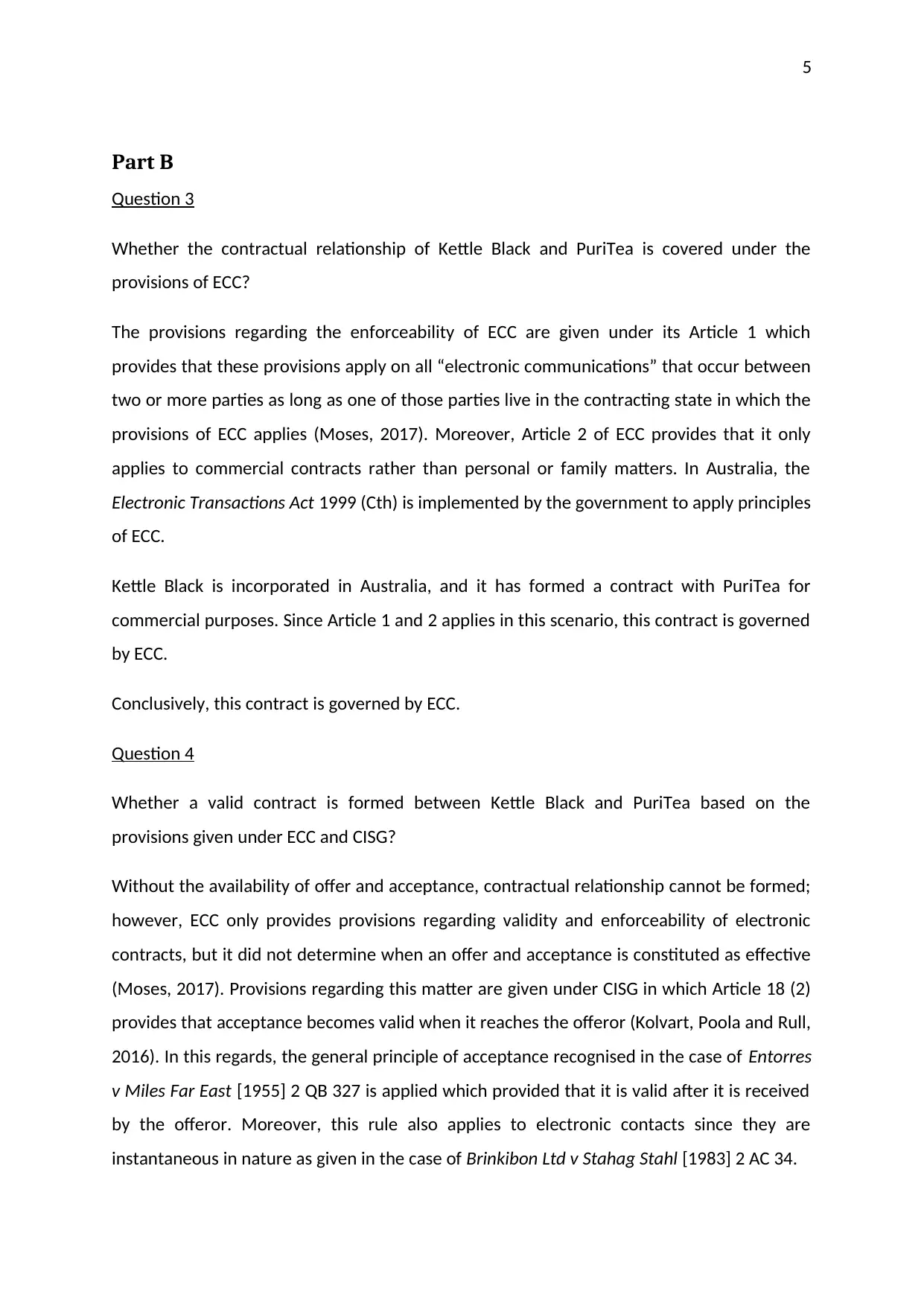
5
Part B
Question 3
Whether the contractual relationship of Kettle Black and PuriTea is covered under the
provisions of ECC?
The provisions regarding the enforceability of ECC are given under its Article 1 which
provides that these provisions apply on all “electronic communications” that occur between
two or more parties as long as one of those parties live in the contracting state in which the
provisions of ECC applies (Moses, 2017). Moreover, Article 2 of ECC provides that it only
applies to commercial contracts rather than personal or family matters. In Australia, the
Electronic Transactions Act 1999 (Cth) is implemented by the government to apply principles
of ECC.
Kettle Black is incorporated in Australia, and it has formed a contract with PuriTea for
commercial purposes. Since Article 1 and 2 applies in this scenario, this contract is governed
by ECC.
Conclusively, this contract is governed by ECC.
Question 4
Whether a valid contract is formed between Kettle Black and PuriTea based on the
provisions given under ECC and CISG?
Without the availability of offer and acceptance, contractual relationship cannot be formed;
however, ECC only provides provisions regarding validity and enforceability of electronic
contracts, but it did not determine when an offer and acceptance is constituted as effective
(Moses, 2017). Provisions regarding this matter are given under CISG in which Article 18 (2)
provides that acceptance becomes valid when it reaches the offeror (Kolvart, Poola and Rull,
2016). In this regards, the general principle of acceptance recognised in the case of Entorres
v Miles Far East [1955] 2 QB 327 is applied which provided that it is valid after it is received
by the offeror. Moreover, this rule also applies to electronic contacts since they are
instantaneous in nature as given in the case of Brinkibon Ltd v Stahag Stahl [1983] 2 AC 34.
Part B
Question 3
Whether the contractual relationship of Kettle Black and PuriTea is covered under the
provisions of ECC?
The provisions regarding the enforceability of ECC are given under its Article 1 which
provides that these provisions apply on all “electronic communications” that occur between
two or more parties as long as one of those parties live in the contracting state in which the
provisions of ECC applies (Moses, 2017). Moreover, Article 2 of ECC provides that it only
applies to commercial contracts rather than personal or family matters. In Australia, the
Electronic Transactions Act 1999 (Cth) is implemented by the government to apply principles
of ECC.
Kettle Black is incorporated in Australia, and it has formed a contract with PuriTea for
commercial purposes. Since Article 1 and 2 applies in this scenario, this contract is governed
by ECC.
Conclusively, this contract is governed by ECC.
Question 4
Whether a valid contract is formed between Kettle Black and PuriTea based on the
provisions given under ECC and CISG?
Without the availability of offer and acceptance, contractual relationship cannot be formed;
however, ECC only provides provisions regarding validity and enforceability of electronic
contracts, but it did not determine when an offer and acceptance is constituted as effective
(Moses, 2017). Provisions regarding this matter are given under CISG in which Article 18 (2)
provides that acceptance becomes valid when it reaches the offeror (Kolvart, Poola and Rull,
2016). In this regards, the general principle of acceptance recognised in the case of Entorres
v Miles Far East [1955] 2 QB 327 is applied which provided that it is valid after it is received
by the offeror. Moreover, this rule also applies to electronic contacts since they are
instantaneous in nature as given in the case of Brinkibon Ltd v Stahag Stahl [1983] 2 AC 34.
⊘ This is a preview!⊘
Do you want full access?
Subscribe today to unlock all pages.

Trusted by 1+ million students worldwide
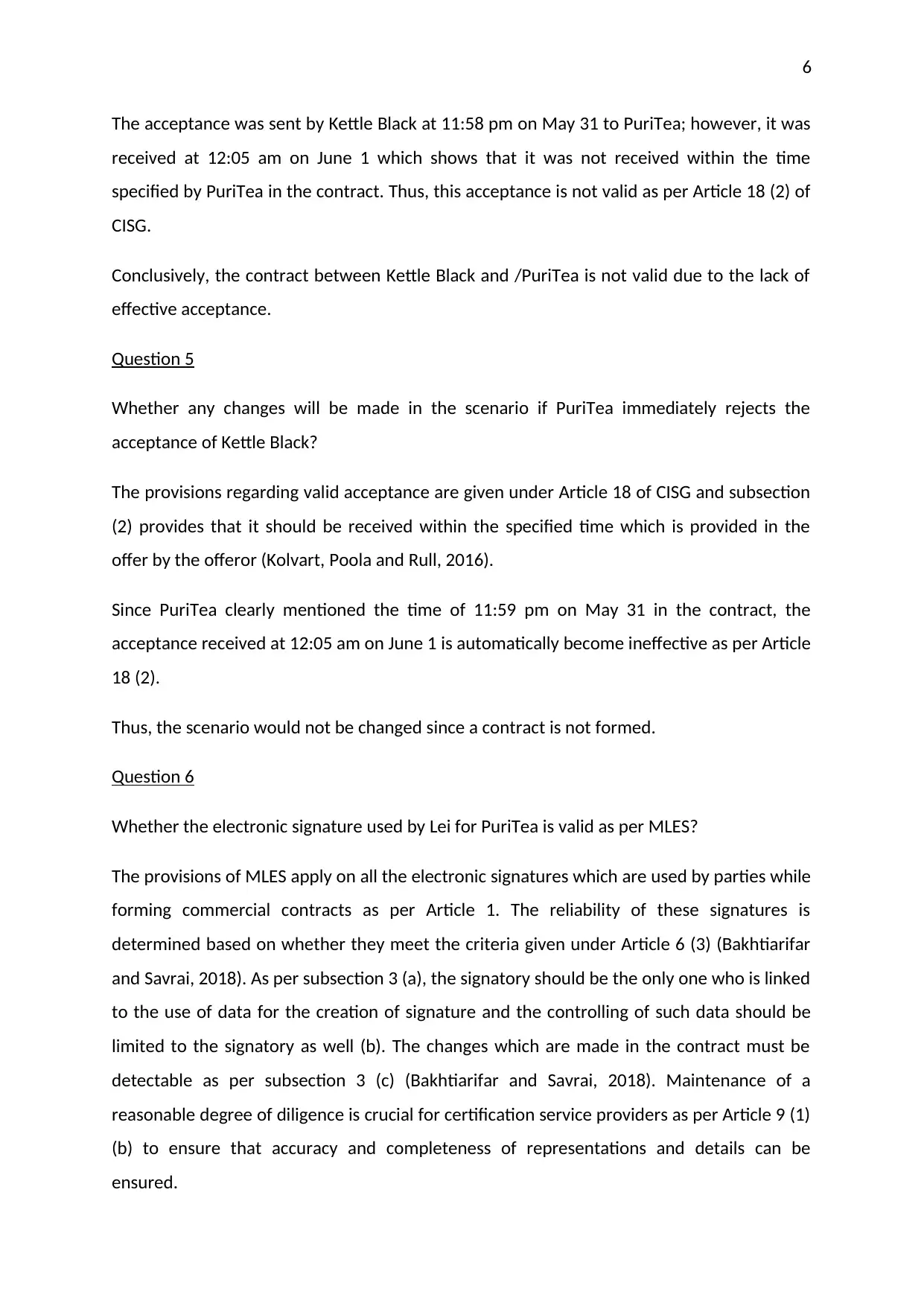
6
The acceptance was sent by Kettle Black at 11:58 pm on May 31 to PuriTea; however, it was
received at 12:05 am on June 1 which shows that it was not received within the time
specified by PuriTea in the contract. Thus, this acceptance is not valid as per Article 18 (2) of
CISG.
Conclusively, the contract between Kettle Black and /PuriTea is not valid due to the lack of
effective acceptance.
Question 5
Whether any changes will be made in the scenario if PuriTea immediately rejects the
acceptance of Kettle Black?
The provisions regarding valid acceptance are given under Article 18 of CISG and subsection
(2) provides that it should be received within the specified time which is provided in the
offer by the offeror (Kolvart, Poola and Rull, 2016).
Since PuriTea clearly mentioned the time of 11:59 pm on May 31 in the contract, the
acceptance received at 12:05 am on June 1 is automatically become ineffective as per Article
18 (2).
Thus, the scenario would not be changed since a contract is not formed.
Question 6
Whether the electronic signature used by Lei for PuriTea is valid as per MLES?
The provisions of MLES apply on all the electronic signatures which are used by parties while
forming commercial contracts as per Article 1. The reliability of these signatures is
determined based on whether they meet the criteria given under Article 6 (3) (Bakhtiarifar
and Savrai, 2018). As per subsection 3 (a), the signatory should be the only one who is linked
to the use of data for the creation of signature and the controlling of such data should be
limited to the signatory as well (b). The changes which are made in the contract must be
detectable as per subsection 3 (c) (Bakhtiarifar and Savrai, 2018). Maintenance of a
reasonable degree of diligence is crucial for certification service providers as per Article 9 (1)
(b) to ensure that accuracy and completeness of representations and details can be
ensured.
The acceptance was sent by Kettle Black at 11:58 pm on May 31 to PuriTea; however, it was
received at 12:05 am on June 1 which shows that it was not received within the time
specified by PuriTea in the contract. Thus, this acceptance is not valid as per Article 18 (2) of
CISG.
Conclusively, the contract between Kettle Black and /PuriTea is not valid due to the lack of
effective acceptance.
Question 5
Whether any changes will be made in the scenario if PuriTea immediately rejects the
acceptance of Kettle Black?
The provisions regarding valid acceptance are given under Article 18 of CISG and subsection
(2) provides that it should be received within the specified time which is provided in the
offer by the offeror (Kolvart, Poola and Rull, 2016).
Since PuriTea clearly mentioned the time of 11:59 pm on May 31 in the contract, the
acceptance received at 12:05 am on June 1 is automatically become ineffective as per Article
18 (2).
Thus, the scenario would not be changed since a contract is not formed.
Question 6
Whether the electronic signature used by Lei for PuriTea is valid as per MLES?
The provisions of MLES apply on all the electronic signatures which are used by parties while
forming commercial contracts as per Article 1. The reliability of these signatures is
determined based on whether they meet the criteria given under Article 6 (3) (Bakhtiarifar
and Savrai, 2018). As per subsection 3 (a), the signatory should be the only one who is linked
to the use of data for the creation of signature and the controlling of such data should be
limited to the signatory as well (b). The changes which are made in the contract must be
detectable as per subsection 3 (c) (Bakhtiarifar and Savrai, 2018). Maintenance of a
reasonable degree of diligence is crucial for certification service providers as per Article 9 (1)
(b) to ensure that accuracy and completeness of representations and details can be
ensured.
Paraphrase This Document
Need a fresh take? Get an instant paraphrase of this document with our AI Paraphraser
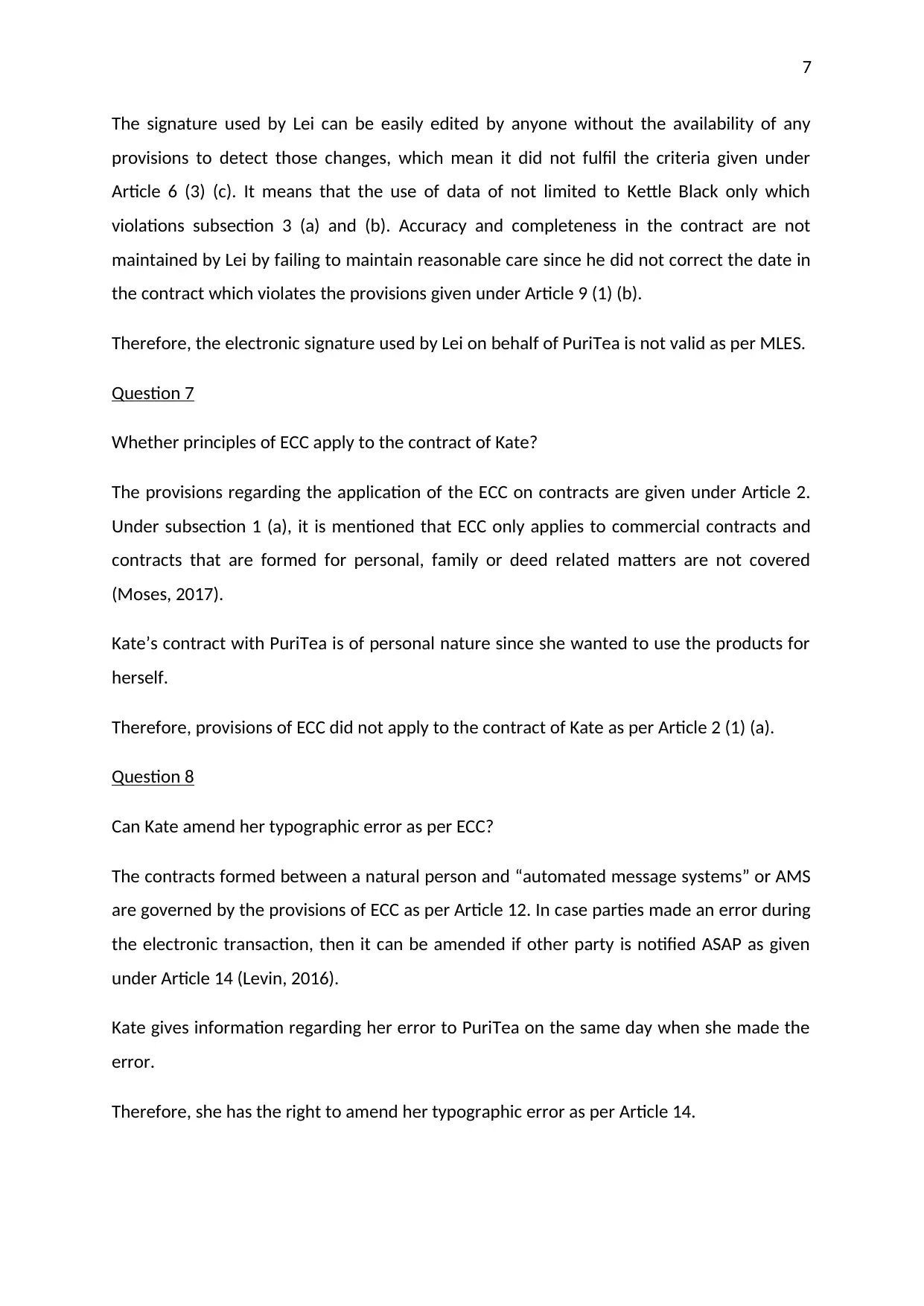
7
The signature used by Lei can be easily edited by anyone without the availability of any
provisions to detect those changes, which mean it did not fulfil the criteria given under
Article 6 (3) (c). It means that the use of data of not limited to Kettle Black only which
violations subsection 3 (a) and (b). Accuracy and completeness in the contract are not
maintained by Lei by failing to maintain reasonable care since he did not correct the date in
the contract which violates the provisions given under Article 9 (1) (b).
Therefore, the electronic signature used by Lei on behalf of PuriTea is not valid as per MLES.
Question 7
Whether principles of ECC apply to the contract of Kate?
The provisions regarding the application of the ECC on contracts are given under Article 2.
Under subsection 1 (a), it is mentioned that ECC only applies to commercial contracts and
contracts that are formed for personal, family or deed related matters are not covered
(Moses, 2017).
Kate’s contract with PuriTea is of personal nature since she wanted to use the products for
herself.
Therefore, provisions of ECC did not apply to the contract of Kate as per Article 2 (1) (a).
Question 8
Can Kate amend her typographic error as per ECC?
The contracts formed between a natural person and “automated message systems” or AMS
are governed by the provisions of ECC as per Article 12. In case parties made an error during
the electronic transaction, then it can be amended if other party is notified ASAP as given
under Article 14 (Levin, 2016).
Kate gives information regarding her error to PuriTea on the same day when she made the
error.
Therefore, she has the right to amend her typographic error as per Article 14.
The signature used by Lei can be easily edited by anyone without the availability of any
provisions to detect those changes, which mean it did not fulfil the criteria given under
Article 6 (3) (c). It means that the use of data of not limited to Kettle Black only which
violations subsection 3 (a) and (b). Accuracy and completeness in the contract are not
maintained by Lei by failing to maintain reasonable care since he did not correct the date in
the contract which violates the provisions given under Article 9 (1) (b).
Therefore, the electronic signature used by Lei on behalf of PuriTea is not valid as per MLES.
Question 7
Whether principles of ECC apply to the contract of Kate?
The provisions regarding the application of the ECC on contracts are given under Article 2.
Under subsection 1 (a), it is mentioned that ECC only applies to commercial contracts and
contracts that are formed for personal, family or deed related matters are not covered
(Moses, 2017).
Kate’s contract with PuriTea is of personal nature since she wanted to use the products for
herself.
Therefore, provisions of ECC did not apply to the contract of Kate as per Article 2 (1) (a).
Question 8
Can Kate amend her typographic error as per ECC?
The contracts formed between a natural person and “automated message systems” or AMS
are governed by the provisions of ECC as per Article 12. In case parties made an error during
the electronic transaction, then it can be amended if other party is notified ASAP as given
under Article 14 (Levin, 2016).
Kate gives information regarding her error to PuriTea on the same day when she made the
error.
Therefore, she has the right to amend her typographic error as per Article 14.
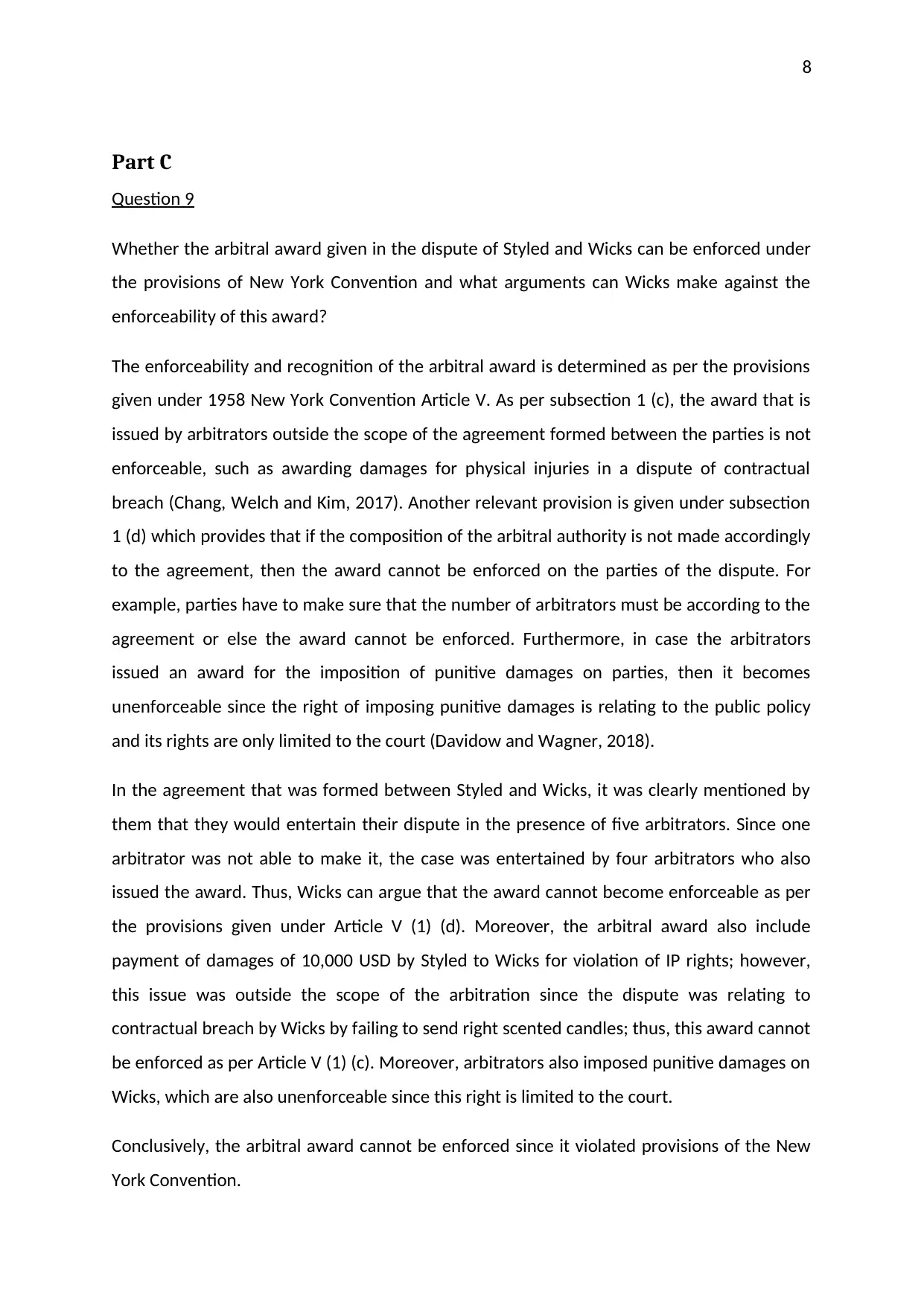
8
Part C
Question 9
Whether the arbitral award given in the dispute of Styled and Wicks can be enforced under
the provisions of New York Convention and what arguments can Wicks make against the
enforceability of this award?
The enforceability and recognition of the arbitral award is determined as per the provisions
given under 1958 New York Convention Article V. As per subsection 1 (c), the award that is
issued by arbitrators outside the scope of the agreement formed between the parties is not
enforceable, such as awarding damages for physical injuries in a dispute of contractual
breach (Chang, Welch and Kim, 2017). Another relevant provision is given under subsection
1 (d) which provides that if the composition of the arbitral authority is not made accordingly
to the agreement, then the award cannot be enforced on the parties of the dispute. For
example, parties have to make sure that the number of arbitrators must be according to the
agreement or else the award cannot be enforced. Furthermore, in case the arbitrators
issued an award for the imposition of punitive damages on parties, then it becomes
unenforceable since the right of imposing punitive damages is relating to the public policy
and its rights are only limited to the court (Davidow and Wagner, 2018).
In the agreement that was formed between Styled and Wicks, it was clearly mentioned by
them that they would entertain their dispute in the presence of five arbitrators. Since one
arbitrator was not able to make it, the case was entertained by four arbitrators who also
issued the award. Thus, Wicks can argue that the award cannot become enforceable as per
the provisions given under Article V (1) (d). Moreover, the arbitral award also include
payment of damages of 10,000 USD by Styled to Wicks for violation of IP rights; however,
this issue was outside the scope of the arbitration since the dispute was relating to
contractual breach by Wicks by failing to send right scented candles; thus, this award cannot
be enforced as per Article V (1) (c). Moreover, arbitrators also imposed punitive damages on
Wicks, which are also unenforceable since this right is limited to the court.
Conclusively, the arbitral award cannot be enforced since it violated provisions of the New
York Convention.
Part C
Question 9
Whether the arbitral award given in the dispute of Styled and Wicks can be enforced under
the provisions of New York Convention and what arguments can Wicks make against the
enforceability of this award?
The enforceability and recognition of the arbitral award is determined as per the provisions
given under 1958 New York Convention Article V. As per subsection 1 (c), the award that is
issued by arbitrators outside the scope of the agreement formed between the parties is not
enforceable, such as awarding damages for physical injuries in a dispute of contractual
breach (Chang, Welch and Kim, 2017). Another relevant provision is given under subsection
1 (d) which provides that if the composition of the arbitral authority is not made accordingly
to the agreement, then the award cannot be enforced on the parties of the dispute. For
example, parties have to make sure that the number of arbitrators must be according to the
agreement or else the award cannot be enforced. Furthermore, in case the arbitrators
issued an award for the imposition of punitive damages on parties, then it becomes
unenforceable since the right of imposing punitive damages is relating to the public policy
and its rights are only limited to the court (Davidow and Wagner, 2018).
In the agreement that was formed between Styled and Wicks, it was clearly mentioned by
them that they would entertain their dispute in the presence of five arbitrators. Since one
arbitrator was not able to make it, the case was entertained by four arbitrators who also
issued the award. Thus, Wicks can argue that the award cannot become enforceable as per
the provisions given under Article V (1) (d). Moreover, the arbitral award also include
payment of damages of 10,000 USD by Styled to Wicks for violation of IP rights; however,
this issue was outside the scope of the arbitration since the dispute was relating to
contractual breach by Wicks by failing to send right scented candles; thus, this award cannot
be enforced as per Article V (1) (c). Moreover, arbitrators also imposed punitive damages on
Wicks, which are also unenforceable since this right is limited to the court.
Conclusively, the arbitral award cannot be enforced since it violated provisions of the New
York Convention.
⊘ This is a preview!⊘
Do you want full access?
Subscribe today to unlock all pages.

Trusted by 1+ million students worldwide
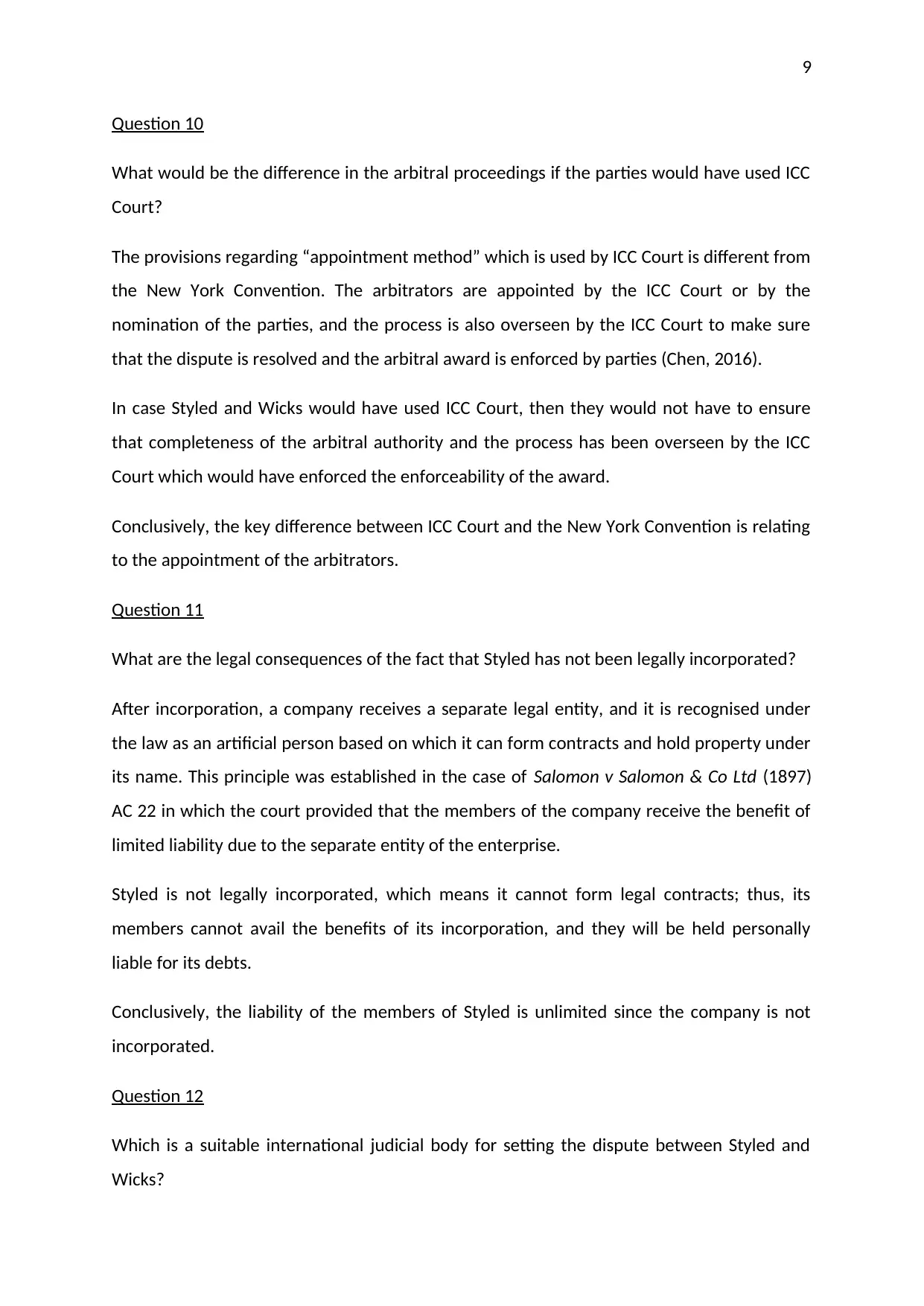
9
Question 10
What would be the difference in the arbitral proceedings if the parties would have used ICC
Court?
The provisions regarding “appointment method” which is used by ICC Court is different from
the New York Convention. The arbitrators are appointed by the ICC Court or by the
nomination of the parties, and the process is also overseen by the ICC Court to make sure
that the dispute is resolved and the arbitral award is enforced by parties (Chen, 2016).
In case Styled and Wicks would have used ICC Court, then they would not have to ensure
that completeness of the arbitral authority and the process has been overseen by the ICC
Court which would have enforced the enforceability of the award.
Conclusively, the key difference between ICC Court and the New York Convention is relating
to the appointment of the arbitrators.
Question 11
What are the legal consequences of the fact that Styled has not been legally incorporated?
After incorporation, a company receives a separate legal entity, and it is recognised under
the law as an artificial person based on which it can form contracts and hold property under
its name. This principle was established in the case of Salomon v Salomon & Co Ltd (1897)
AC 22 in which the court provided that the members of the company receive the benefit of
limited liability due to the separate entity of the enterprise.
Styled is not legally incorporated, which means it cannot form legal contracts; thus, its
members cannot avail the benefits of its incorporation, and they will be held personally
liable for its debts.
Conclusively, the liability of the members of Styled is unlimited since the company is not
incorporated.
Question 12
Which is a suitable international judicial body for setting the dispute between Styled and
Wicks?
Question 10
What would be the difference in the arbitral proceedings if the parties would have used ICC
Court?
The provisions regarding “appointment method” which is used by ICC Court is different from
the New York Convention. The arbitrators are appointed by the ICC Court or by the
nomination of the parties, and the process is also overseen by the ICC Court to make sure
that the dispute is resolved and the arbitral award is enforced by parties (Chen, 2016).
In case Styled and Wicks would have used ICC Court, then they would not have to ensure
that completeness of the arbitral authority and the process has been overseen by the ICC
Court which would have enforced the enforceability of the award.
Conclusively, the key difference between ICC Court and the New York Convention is relating
to the appointment of the arbitrators.
Question 11
What are the legal consequences of the fact that Styled has not been legally incorporated?
After incorporation, a company receives a separate legal entity, and it is recognised under
the law as an artificial person based on which it can form contracts and hold property under
its name. This principle was established in the case of Salomon v Salomon & Co Ltd (1897)
AC 22 in which the court provided that the members of the company receive the benefit of
limited liability due to the separate entity of the enterprise.
Styled is not legally incorporated, which means it cannot form legal contracts; thus, its
members cannot avail the benefits of its incorporation, and they will be held personally
liable for its debts.
Conclusively, the liability of the members of Styled is unlimited since the company is not
incorporated.
Question 12
Which is a suitable international judicial body for setting the dispute between Styled and
Wicks?
Paraphrase This Document
Need a fresh take? Get an instant paraphrase of this document with our AI Paraphraser
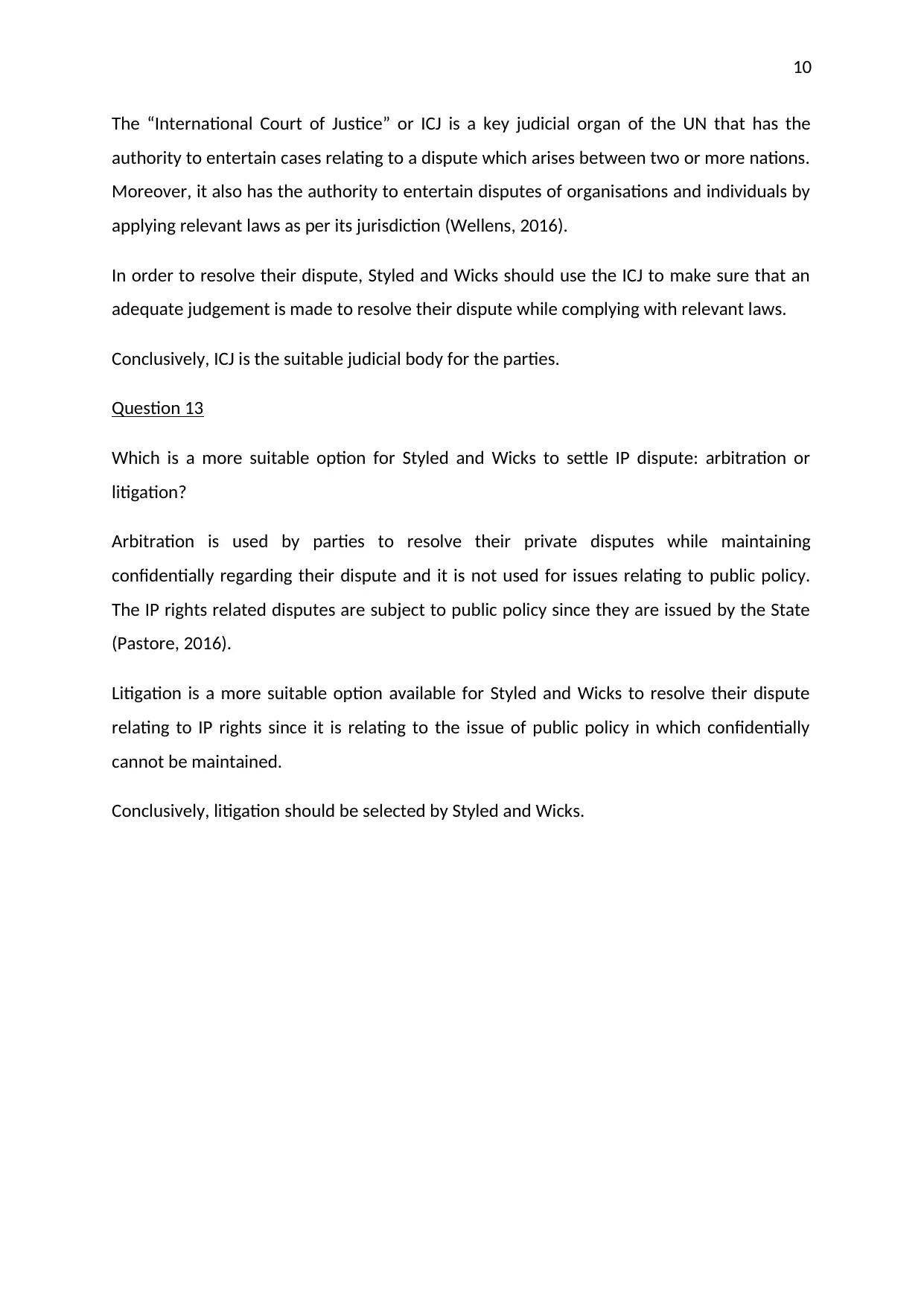
10
The “International Court of Justice” or ICJ is a key judicial organ of the UN that has the
authority to entertain cases relating to a dispute which arises between two or more nations.
Moreover, it also has the authority to entertain disputes of organisations and individuals by
applying relevant laws as per its jurisdiction (Wellens, 2016).
In order to resolve their dispute, Styled and Wicks should use the ICJ to make sure that an
adequate judgement is made to resolve their dispute while complying with relevant laws.
Conclusively, ICJ is the suitable judicial body for the parties.
Question 13
Which is a more suitable option for Styled and Wicks to settle IP dispute: arbitration or
litigation?
Arbitration is used by parties to resolve their private disputes while maintaining
confidentially regarding their dispute and it is not used for issues relating to public policy.
The IP rights related disputes are subject to public policy since they are issued by the State
(Pastore, 2016).
Litigation is a more suitable option available for Styled and Wicks to resolve their dispute
relating to IP rights since it is relating to the issue of public policy in which confidentially
cannot be maintained.
Conclusively, litigation should be selected by Styled and Wicks.
The “International Court of Justice” or ICJ is a key judicial organ of the UN that has the
authority to entertain cases relating to a dispute which arises between two or more nations.
Moreover, it also has the authority to entertain disputes of organisations and individuals by
applying relevant laws as per its jurisdiction (Wellens, 2016).
In order to resolve their dispute, Styled and Wicks should use the ICJ to make sure that an
adequate judgement is made to resolve their dispute while complying with relevant laws.
Conclusively, ICJ is the suitable judicial body for the parties.
Question 13
Which is a more suitable option for Styled and Wicks to settle IP dispute: arbitration or
litigation?
Arbitration is used by parties to resolve their private disputes while maintaining
confidentially regarding their dispute and it is not used for issues relating to public policy.
The IP rights related disputes are subject to public policy since they are issued by the State
(Pastore, 2016).
Litigation is a more suitable option available for Styled and Wicks to resolve their dispute
relating to IP rights since it is relating to the issue of public policy in which confidentially
cannot be maintained.
Conclusively, litigation should be selected by Styled and Wicks.
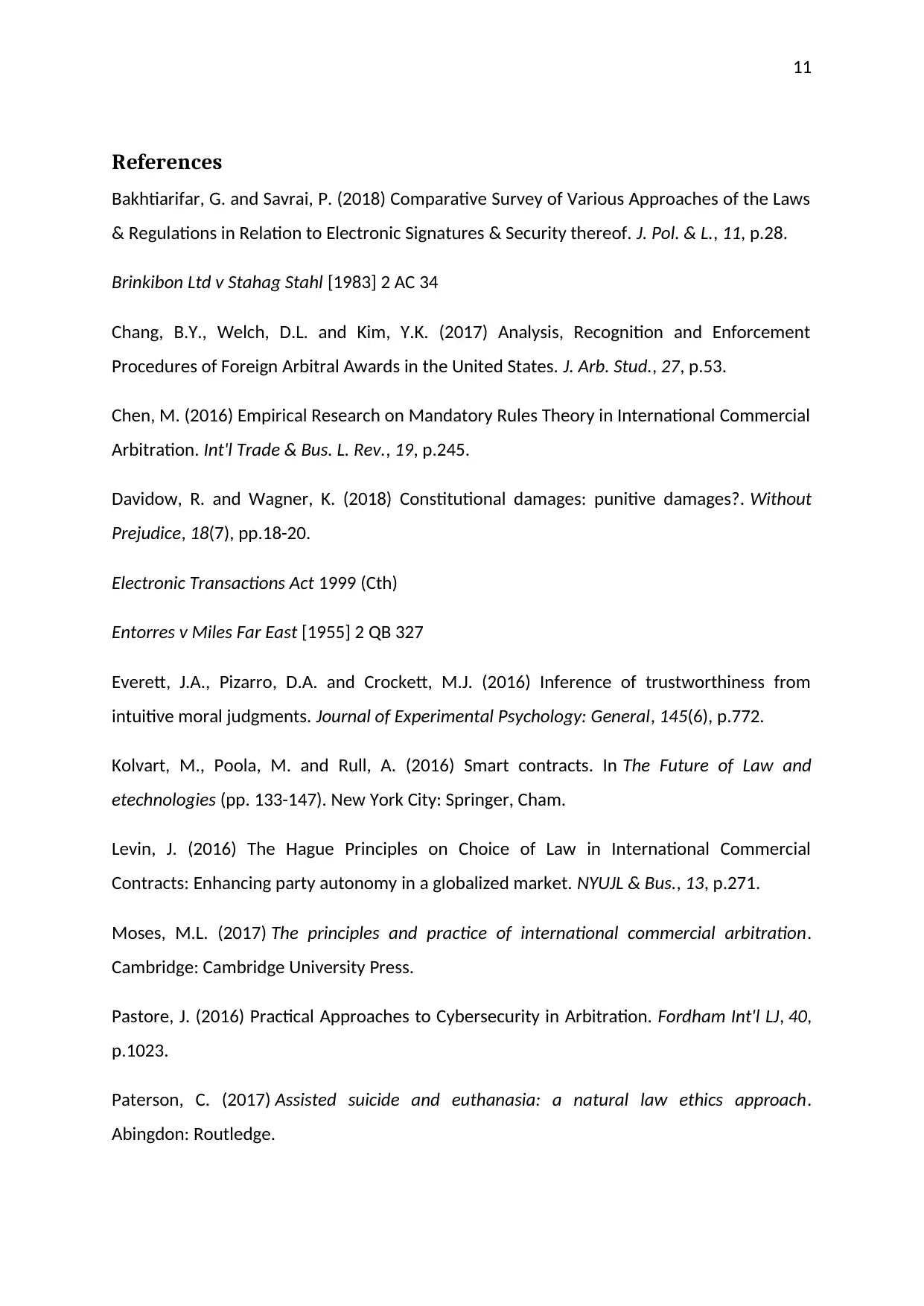
11
References
Bakhtiarifar, G. and Savrai, P. (2018) Comparative Survey of Various Approaches of the Laws
& Regulations in Relation to Electronic Signatures & Security thereof. J. Pol. & L., 11, p.28.
Brinkibon Ltd v Stahag Stahl [1983] 2 AC 34
Chang, B.Y., Welch, D.L. and Kim, Y.K. (2017) Analysis, Recognition and Enforcement
Procedures of Foreign Arbitral Awards in the United States. J. Arb. Stud., 27, p.53.
Chen, M. (2016) Empirical Research on Mandatory Rules Theory in International Commercial
Arbitration. Int'l Trade & Bus. L. Rev., 19, p.245.
Davidow, R. and Wagner, K. (2018) Constitutional damages: punitive damages?. Without
Prejudice, 18(7), pp.18-20.
Electronic Transactions Act 1999 (Cth)
Entorres v Miles Far East [1955] 2 QB 327
Everett, J.A., Pizarro, D.A. and Crockett, M.J. (2016) Inference of trustworthiness from
intuitive moral judgments. Journal of Experimental Psychology: General, 145(6), p.772.
Kolvart, M., Poola, M. and Rull, A. (2016) Smart contracts. In The Future of Law and
etechnologies (pp. 133-147). New York City: Springer, Cham.
Levin, J. (2016) The Hague Principles on Choice of Law in International Commercial
Contracts: Enhancing party autonomy in a globalized market. NYUJL & Bus., 13, p.271.
Moses, M.L. (2017) The principles and practice of international commercial arbitration.
Cambridge: Cambridge University Press.
Pastore, J. (2016) Practical Approaches to Cybersecurity in Arbitration. Fordham Int'l LJ, 40,
p.1023.
Paterson, C. (2017) Assisted suicide and euthanasia: a natural law ethics approach.
Abingdon: Routledge.
References
Bakhtiarifar, G. and Savrai, P. (2018) Comparative Survey of Various Approaches of the Laws
& Regulations in Relation to Electronic Signatures & Security thereof. J. Pol. & L., 11, p.28.
Brinkibon Ltd v Stahag Stahl [1983] 2 AC 34
Chang, B.Y., Welch, D.L. and Kim, Y.K. (2017) Analysis, Recognition and Enforcement
Procedures of Foreign Arbitral Awards in the United States. J. Arb. Stud., 27, p.53.
Chen, M. (2016) Empirical Research on Mandatory Rules Theory in International Commercial
Arbitration. Int'l Trade & Bus. L. Rev., 19, p.245.
Davidow, R. and Wagner, K. (2018) Constitutional damages: punitive damages?. Without
Prejudice, 18(7), pp.18-20.
Electronic Transactions Act 1999 (Cth)
Entorres v Miles Far East [1955] 2 QB 327
Everett, J.A., Pizarro, D.A. and Crockett, M.J. (2016) Inference of trustworthiness from
intuitive moral judgments. Journal of Experimental Psychology: General, 145(6), p.772.
Kolvart, M., Poola, M. and Rull, A. (2016) Smart contracts. In The Future of Law and
etechnologies (pp. 133-147). New York City: Springer, Cham.
Levin, J. (2016) The Hague Principles on Choice of Law in International Commercial
Contracts: Enhancing party autonomy in a globalized market. NYUJL & Bus., 13, p.271.
Moses, M.L. (2017) The principles and practice of international commercial arbitration.
Cambridge: Cambridge University Press.
Pastore, J. (2016) Practical Approaches to Cybersecurity in Arbitration. Fordham Int'l LJ, 40,
p.1023.
Paterson, C. (2017) Assisted suicide and euthanasia: a natural law ethics approach.
Abingdon: Routledge.
⊘ This is a preview!⊘
Do you want full access?
Subscribe today to unlock all pages.

Trusted by 1+ million students worldwide
1 out of 13
Your All-in-One AI-Powered Toolkit for Academic Success.
+13062052269
info@desklib.com
Available 24*7 on WhatsApp / Email
![[object Object]](/_next/static/media/star-bottom.7253800d.svg)
Unlock your academic potential
Copyright © 2020–2026 A2Z Services. All Rights Reserved. Developed and managed by ZUCOL.

